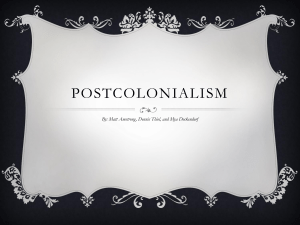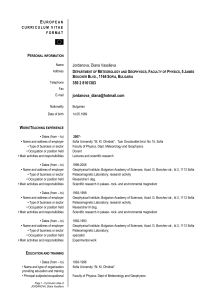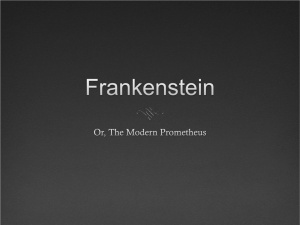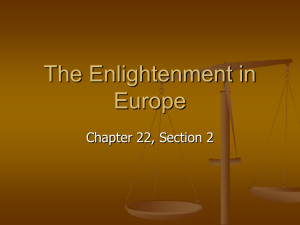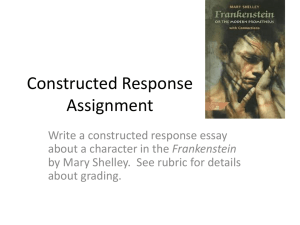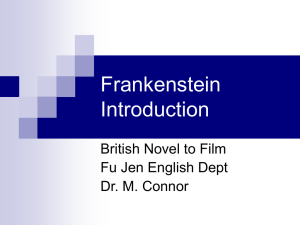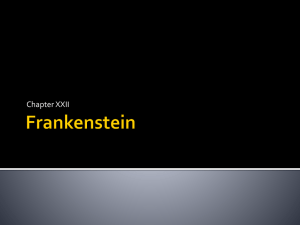How to Be a Good Conversationalist
advertisement
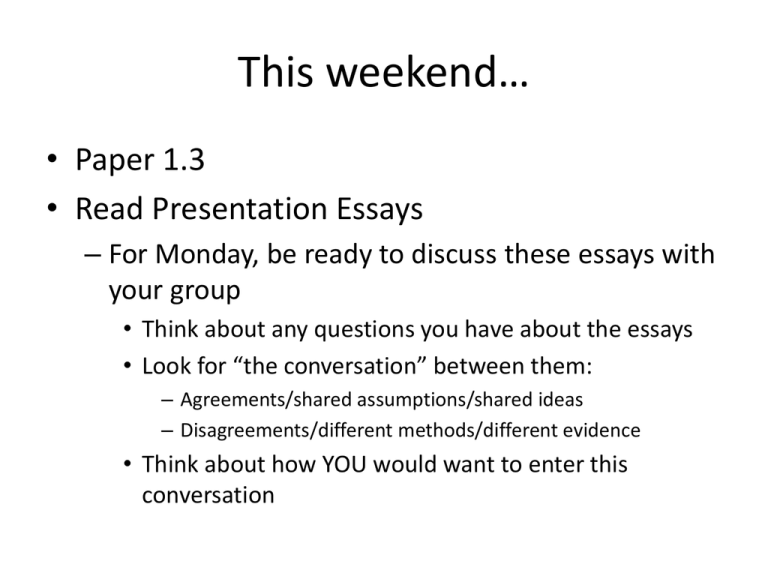
This weekend… • Paper 1.3 • Read Presentation Essays – For Monday, be ready to discuss these essays with your group • Think about any questions you have about the essays • Look for “the conversation” between them: – Agreements/shared assumptions/shared ideas – Disagreements/different methods/different evidence • Think about how YOU would want to enter this conversation How to Be a Good Conversationalist TS English/Fall2014 “Steps” for Paper 1.3 • In this order… 1. A short, and purposeful summary that leads to… 2. The SPECIFIC claim in Jordanova’s essay that you are RESPONDING to (quote) which leads up to…. 3. YOUR OWN CLAIM which requires… 4. One or two pieces of evidence/analysis that support it “Steps” for Paper 1.3 In this order… 1. A short, and directed summary that leads up to… 2. The SPECIFIC aspect of Jordanova’s essay that you are RESPONDING to (quote) which leads up to…. 3. YOUR OWN CLAIM which requires… 4. One or two pieces of evidence/analysis that support it “They Say”… “I Say”… Being a Good Conversationalist • AGREEING – In a conversation, a person who simply agrees without contributing his own arguments is like a “yes” man who evidently has no thoughts of his own. – If you “agree” be sure to make your own claim by… • Proposing ramifications of the claim that the original author has not seen. (“This claim is important because it also helps us to understand…”) • Applying their ideas to another object or aspect of the text. (“This claim also applies in X situation, where it helps us to see…”) Being a Good Conversationalist “In the area of gender and sexuality there was a need to create a secure masculine identity for practitioners of science and medicine, which allowed that natural knowledge was exciting and to be sought in the fashion of a quest, but which resisted any suggestion that it was totally seductive” (Jordanova 72). Jordanova’s research reveals a connection between the legitimacy of science in the early 19th century and the way that it was presented as “gendered.” Jordanova’s argument that masculinity serves as an index of this legitimacy is important because it also helps us to understand gender in a broader sense Being a Good Conversationalist “In the area of gender and sexuality there was a need to create a secure masculine identity for practitioners of science and medicine, which allowed that natural knowledge was exciting and to be sought in the fashion of a quest, but which resisted any suggestion that it was totally seductive” (Jordanova 72). Jordanova’s research reveals a connection between the legitimacy of science in the early 19th century and the way that it was presented as “gendered.” Jordanova’s argument that masculinity serves as an index of this legitimacy is important because it also helps us to understand gender in a broader sense. If masculinity is defined as ambitious and yet resisting “seduction,” and is a sign of what is legitimate in the early 19th century, then we can see how femininity conversely stands for the illegitimate and the unrestrained. In Shelley’s novel, these traits are attributed to the female monster, and they reveal a deep seeded anxiety about women’s ability to determine both social stability and racial reproduction. Being a Good Conversationalist • DISAGREEING – In a conversation, a person who simply disagrees without contributing her own ideas or counterarguments is like a grump who doesn’t seem to want the conversation to go on at all. – If you “disagree” be sure to make your own claim by… • Defining exactly what the limitations of the claim are (The argument is limited in that it fails to…) • Proposing an alternative solution to the idea that you think is wrong or problematic (Instead, I see this as…) Being a Good Conversationalist • CAUTION! Any disagreement you take up in your writing must be justified by evidence/analysis. This means that you should need to consider your own evidence and the evidence of the author you are responding to. – Ex. I disagree with Jordanova’s idea that science was conflicted in 19th C British society. (do you have the historical evidence that would contradict Jordanova’s historical evidence?) Being a Good Conversationalist “Far from being a simple moralistic tale of masculinist, scientific overreaching… Frankenstein is a remarkably precise exploration of the internal conflicts felt by practitioners in a variety of fields” (Jordanova 60). Part of the reason that Jordanova can make this claim is because she understands Frankenstein’s psyche as “the central monstrosity that the novel explores” (60). While I agree that Frankenstein is not a “simple’ morality tale, I disagree with this view, because it seems clear to me that there are many forms of monstrousness in this novel. Being a Good Conversationalist “Far from being a simple moralistic tale of masculinist, scientific overreaching… Frankenstein is a remarkably precise exploration of the internal conflicts felt by practitioners in a variety of fields” (Jordanova 60). Part of the reason that Jordanova can make this claim is because she understands Frankenstein’s psyche as “the central monstrosity that the novel explores” (60). While I agree that Frankenstein is not a “simple’ morality tale, I disagree with this view, because it seems clear to me that there are many forms of monstrousness in this novel. Focusing on Frankenstein’s creation, I argue that the novel is actually a “precise exploration” of the way that these “internal conflicts” in the culture of science had profoundly social consequences, particularly in the realm of institutions and law. Being a Good Conversationalist • Tips – Even though you are responding, that does not mean that you can’t have the conversation you want to have. – Potential response topics coming out of Jordanova: Science, gender, life/death, social class, community, morality, nature, history/progress, professionalization/institutions, heroism, romantic narrative, sexuality, the supernatural, the body (or any topic that you can suggest is connected to any of these) Being a Good Conversationalist • Tips: – The best response claims are the ones that are at least as specific as the work they are responding to. “While I agree that Frankenstein represents the importance of what Jordanova calls the “balancing acts” of scientific practice, I would add that all life is a balancing act.” “While I agree that Frankenstein represents the importance of what Jordanova calls the “balancing acts” of scientific practice, Shelley also suggests that the contradictions in gender of the period make these balancing acts impossible.” There is absolutely no doubt that in building a set of self-images for those who unveiled nature, the vocabulary of romantic heroism and genius had huge importance. (70) Mary Shelley has grasped perfectly the fantasies of (at least some) medical practitioners of the time, which involved imagining transcendent powers that were almost their own. (67)
